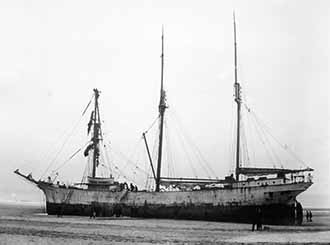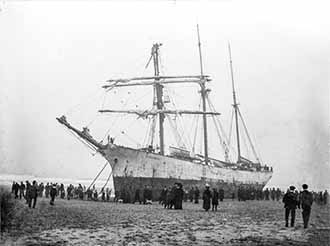Storm Casualties
Barquentine Ashore
Exciting Lifeboat Rescue at South Shields
Abortive Rocket Firing
The North-east coast was yesterday swept by a severe storm, which, unhappily, went not unattended by disaster. It was a day of almost unprecedented boisterousness on both sea and land, rain and sleet alternating, while the wind blew from the sea in fearful gusts. The streets of South Shields, in common with other towns, were literally submerged in a soft melting snow which in some places came over the boot tops. Pedestrians were compelled to do a veritable plodge, and nobody turned out of doors who had the privilege of staying in.
The wind blew in great squalls all through the day, and heavy a heavy broke across the harbour month. The waves at high water swept practically the whole length of the piers. The South Shields Life brigadesmen were on duty at the Watch House throughout the whole the day. Capt. James Page in charge in the afternoon, while later Capts. T B. Grimes. W. Buckland, and T. Oliver came on duty.
In the evening there was a big muster of the men, and everything was got in readiness in case of emergency.
Near the hour of half past eight the lookout in the Watch Tower saw the light of a vessel dangerously close to the shore to the south of the pier end A squall of sleet and snow had just preceded it and suggested the possibility of a vessel having in the blinding storm lost her way. This proved to be only too true. The movements of the ship were followed with anxious interest the look-out and it soon became obvious that she was gradually casting ashore.
Discovered by Searchlight
Only her lights were visible. Immediately orders were given for the searchlight to be got in readiness and only a few minutes sufficed for this done. The lantern was turned in the direction the doomed ship and a beautiful stream of electric light discovered her among the breakers near the extreme end of the beach. Her stranding was inevitable, and before she had struck the shore the warning signals had been given by the coastguard and preparations were already in hand for rendering succour to her crew. This, this by the way, is the first occasion that the “Gazette" searchlight has been requisitioned for a shipwreck, and its value in the services that followed was inestimable, both for rescued and rescuers. From every part of the beach, although the doomed vessel lay nearly a mile distant from the pier she could be easily seen as in daylight. Indeed, from the higher parts of the town residents looked out of their windows upon the whole scene which was depicted with a vividness that, it, the surrounding blackness of the night, was weird and fascinating in the extreme.
Rush to the Sands
The sound of the alarm guns was followed by a rush to the seaside by thousands of the towns inhabitants, who trudged uncomplainingly through the slushy streets. With one accord, they swarmed over the sands towards the stranded vessel which lay snugly on the beach, with white water all round her, about 200 yards north of the Trow Rocks.
There were thousands of willing hands to help if they had been wanted, but the brigadesmens’ duties were rather impeded than facilitated by the crowds. The lifesaving apparatus was taken speedily along the beach to since a point opposite the wreck, the crew of which could easily be seen by the people on the shore. A rocket was despatched with the whip line and appeared to reach the vessel, but there was no attempt on the part of the crew to haul on it, the explanation for which was afterwards forthcoming from the captain, who stated that his men were unacquainted and indeed ignorant of the use of the apparatus. The brigadesmen after a brief interval, fired a second rocket which went clean through the tattered sails on the mizzen mast. But still there was no response from the crew, although it was perfectly obvious that the line had been thrown successfully over the ship.
Launching the Lifeboat
However, anxiety was greatly allayed by the fact that the vessel which was steel built, was lying on a soft bottom, and for the present was perfectly safe. But all this time brave efforts were being made to launch the lifeboat, and here again the searchlight performed excellent, almost indispensable aid to the rescuers. Not for eight years had the Willie Wouldhave been taken from her home on the south beach for rescuing work. But once the appeal was made there were strong and willing hands in abundance to bring the lifeboat forth. She was dragged along the beach to within one hundred yards north of the wreck, and manned, chiefly by pilots, who wore their cork jackets. The coxswain was Mr Ralph Harrison, under whose instructions the launching operations took place. This was not easy of accomplishment in a rough sea and in a falling tide, but all difficulties and dangers were eventually got over, and amid terrific cheering from the throats of thousands of spectators, the lifeboat surged through the broken waters on her way to the ship. In the final effort, as many hands as could be laid on the craft, were readily forthcoming from the crowd, and many of them had to wade up to the waist in the surf to give the boat a successful send off. Thousands of eyes followed with eager interest the course of the lifeboat through the broken waters, and the enthusiasm of the throng broke out afresh in lusty cheers when her head was seen coming round the stern of the wreck and take the shelter of the leeside.
The Crew Landed
A rope was got onboard the ship and the lifeboat came safely alongside and took on board the crew, the master being the last to leave his ship. The shipwrecked men were safely landed on the shore and escorted to the Brigade House, where Dr Crease and Dr Galloway were in attendance with restoratives and dry clothing.
It then transpired that the vessel was the barquentine Alphonse of Christiania, an iron ship of 396 tons burthen. She was on a voyage from Flushing to Grangemouth with silver sand.
The Captain Interviewed
Seen by a “Gazette” reporter the captain of the Alphonse, G. Gallaksen, a Norwegian, who spoke excellent English, said his vessel had been sixteen days on the voyage. Given fair winds the voyage should have been done in two days, but they had practically covered the distance three times over owing to adverse winds. Three times the barquentine had been in sight of her port and blown to sea again by northerly and westerly winds. The members of the crew had suffered great privations from almost incessant duty and exposure to the storm. Yesterday was one of the worst days experienced. Throughout the livelong day the seas were breaking aboard, washing the decks fore and aft, while the ship tossed about tremendously. Her foretopmast was carried away by the gale, which also blew many of the sails to shreds. Last night the vessel arrived off the Tyne, where in a along blinding snowstorm they lost sight entirely of the shore lights. When the storm cleared the ship was dangerously close to the shore, and it was found impossible to get her round to windward again and she drifted helplessly on to the beach. The Alphonse was built in Arundel in 1903.
Capt. Gallaksen was enthusiastic in extolling the value of the searchlights. “I have seen nothing like it before” he said, “and it is really fine. I could see all my crew, and it was so easy to give orders and see them carried out-just as though it were daylight.”
Asked if the brilliant light suddenly thrown upon them in the darkness had any disadvantages, he said, “No, no; it was quite the other way. We could walk about the decks as if it were daytime. I have not seen anything so fine before for shipwrecks.”
The captain also spoke in high compliment of the lifeboatmen.
With regard to the lifeboat services it may be mentioned that as the boat neared the shore with the survivors of the wreck the first to take the plunge into the surf and carry the line ashore to the public to haul in was “Dick” Wilson.
Position of the Alphonse
Since last night the stranded vessel has been driven further shorewards, and she is still on a firm bottom, but the action of the heavy seas has had the effect of driving the barquentine practically broadside on to the sea. She does not appear up to the present to have suffered a great deal of damage.
Source: Shields Daily Gazette 29 January 1910
The Stranded Alphonse
Salvage Operations
It is probable, should the tides prove suitable, that an attempt will be made to salve the Norwegian schooner Alphonse, ashore at the Trow Rocks, South Shields, on Friday first. Her cargo of silver sand now being discharged into hand barrows and carted away. The contract for salving and discharging the vessel is in the hands of Messrs Lindsay, Carver, Hill, and Co.. Sunderland, salvage contractors. When the Alphonse is floated it is not known whether she may be ta-ken to Sunderland or brought into the Tyne. She is lying perfectly easy, and does not appear to have suffered any damage to her hull.
Source: Shields Daily Gazette 8 February 1910
The Stranded Alphonse
Successful Salvage Work
On Saturday the salvage work in floating the stranded barquentine Alphonse off the beach at South Shields was successfully accomplished. The salvage contractors were Messrs Lindsay Caverhill and Company, Sunderland, who in the first place had practically the whole the vessel’s cargo, consisting of silver sand, discharged, but owing to the high tides and strong winds it was found necessary to flood the hold on Friday night to prevent her from being driven further shorewards. This was proved to have a good effect.
With the cables out, the vessel held pretty firm till the hawsers were transferred to the tugs Rescue and Conqueror. After upwards of an hour’s towing at full steam they managed to move the Alphonse into deep water, taking her into Shields harbour, where she was afterwards docked in the Middle Docks and Engineering Company's Docks, South Shields.
The vessel two hours before she was floated rocked very much, frequently heeling over considerably, but this was merely through the action of the incoming tide. The salvage work brought some hundreds of people down to the beach. An examination will be made today to ascertain whether she has sustained any serious damage.
Source: Shields Daily Gazette 14 February 1910

